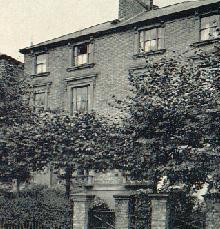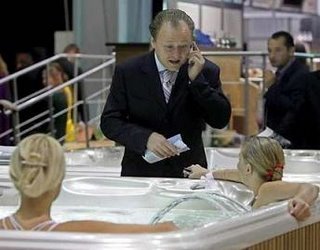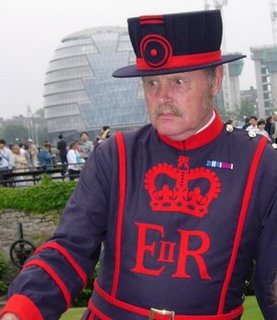
This is a magnetic tale of death and love, sin and virtue. There are two sides of the story – the physical, which is sordid, dreadful and revolting, and the spiritual, which is good and heroic.
Number 39 Hilldrop Crescent was near Camden Road, Holloway, North London. By 1910, the neighborhood had slightly gone down in the social scale but was still cobble-stoned, tree-lined and pert.
This smoky July morning, Inspector Dew alit from his carriage and, tipping the cabbie, ascended to jingle the doorbell. A brass plaque beside the bell read, "CRIPPEN". A small, delicate girl, of no more than 16 years of age, answered, "Oui, monsieur?" Dew hoped she understood English.
"Is your master at home?" the detective asked.
"Mashter?" she was quizzical.
Dew had no idea what the French word was for doctor, so he asked, "Yes, Monsieur Crippen. Is he inside? This she understood. From the top of the staircase he now heard approaching boot steps and Doctor Hawley Harvey Crippen entered.
He was a small man in his mid-forties with a fresh complexion, light brown hair, which he brushed carefully over a bald spot, and a straggly sandy mustache above a receding chin," explains Tom Cullen . "His gray eyes, which were magnified slightly by gold-rimmed spectacles, were undoubtedly his most remarkable feature.
"Hello." The little man – no more than 5'5" -- held out his whitish hand. The policeman shook it and found, while doing so, that it was not as weak as it looked. "Dr. Hawley Crippen?" Dew inquired. The other nodded, not sure whether to smile or frown.
"I need to grab just a little of your time to ask you a few questions."
"Oh?" Crippen answered. "Why don't we step into the front parlor, if that’s all right."
The inspector followed the doctor into a room of tasteful furniture and potted palms. There was a definite scent of a woman's fine perfume – but not the maid’s. Noticing trifles were all part of his work, having been a professional investigator for the past 23 years.
The detective liked the fact that Crippen didn't seem at all nervous. Yes, Dew thought to himself, nothing wrong here. "Dr. Crippen, first, allow me to express my condolences over the recent death of your wife, Belle. I understand she is sorely missed by your friends."
The other nodded in appreciation.
"But, because of her passing, there is, I'm sorry to say, a mystery. Dr. Crippen, a number of your wife's professional acquaintances have doubts about her sudden trip to America, which caused her sudden death abroad."
"The Ladies' Guild," Crippen nodded.
"They are...what?... actresses, as was your wife?"
"Music hall people, mostly. My wife, she was a singer, not very famous, mind you, but she enjoyed it. They raise money for charities, mostly."
"Remarkable," Dew whispered, "I can go back to Scotland Yard now and reassure them that nothing out of the ordinary has occurred."
"Inspector, are they saying I've killed my wife or something?"
Dew was surprised. "Actually, they claim that she had many commitments with them in February and thought it out of character for her to flee without a personal word. "Doctor, I must be direct: your living here with another lady. Miss Le Neve, I believe her name is..."
Crippen remained unshaken. "I know...I know it does look suspicious, Inspector... may we talk man to man?"
"Please!" Dew urged.
"Inspector—" he paused, breathed deeply, and went on, " I admit: I lied. My wife did not to go to America to visit a sick relative. She did not die. That was all a story."
Dew sat upright. "Then where is she?"
"Oh. she's in America all right, but... she left me for another man, Inspector." He looked glum. "We never got along, her and I, guess I couldn't please her...in many ways. She told me she was leaving for Chicago, but Lord knows if she really went there or not. Bruce Miller's his name."
"Then there have been marital problems for some time?"
"For years, Inspector."
Dew smiled softly.
"I...I panicked when she left that night in February, for I could see that scandal could ruin my professional standing. I was probably more ashamed of myself, really. No man likes to think he can't hold on to his wife."
"I see." Dew pondered,. "What about your friend, Miss Le Neve, who...shares your quarters here? Does she know Belle exists?"
"She...she believes like the rest of my friends that Belle has died."
The detective grimaced. "Dr. Crippen, do you think it's right …"
"Inspector, Ethel and I have become as man and wife. We love each other to the bone. She knows the history of Belle and I," the other answered, "Belle's unfaithfulness to me, our quarrels. "
"I'm sure Miss Le Neve is a fine lady."
"And a wonderful help in my business!" Crippen perked. "She's my secretary, you know. In fact," he glanced at his pocket watch, "she's at the office as we speak, catching up on some early work. I was about to go to her."
"Yes, well, first off, Doctor, we need to find Belle. A formality, you understand.
"I agree wholeheartedly!" Crippen replied. "Inspector...you think I'm a mouse, don't you?"
"A mouse? Oh, you mean in Shakespeare."
Dew was satisfied. He drew up a quick statement, which Crippen read and signed, and the detective felt it had been a good morning's work.
Crippen shut the door, and exhaled, deeply. His head throbbed. He remembered how he had cut out her heart and had thrown it in the canal after he had killed her and buried her beneath the house.
Belle had wanted glitter and tinsel, he’d wanted to be thought of as something more than just a little man.
Hawley Harvey Crippen was born near the Coldwater River in Michigan, U.S.A. As a child, he would tell his friends he was going to be a physician. After graduating from the University of Michigan, he earned an M.D. then relocated to New York City as an eye and ear specialist. While there, Crippen wooed and won Irish Charlotte Bell, a nurse but she died of apoplexy in January, 1892. He returned east and met Belle.
To a man like Crippen, raised with the idea that work, work, work is all that matters, Belle was a strange and alluring animal. 30-year-old Hawley Crippen fell for her high spirits and free sexuality. Belle, in turn, felt attracted to Crippen by his profession. Hawley Crippen, M.D. could buy her way up. Leaving home at 16 years old, she’d been taught by high-class teachers in exchange for sex. But, fate can be darkly comical. Almost immediately after their marriage, Crippen’s branch of medicine became unfashionable, money had run dry. Belle, stuck at home ironing, suffocated slowly out of her element.
For a while, Crippen practised dentistry. Then Professor Horace Munyon gave him the chance of a lifetime: to establish and manage the first of Munyon's overseas offices. He was going to London, England, guaranteed a salary of $10,000 a year – exorbitant for 1897. Belle covered her wrists and huge cleavage in gems and expensive baubles. She met a swaggering man-about-town named Bruce Miller.
Belle went on stage but failed to charm her nightly audiences – one evening they booed her – and the production closed within the week. Her voice matched her personality, and was loud, vulgar and lacking in feminine charm. Short and big, she sang lyrics such as, "I'm called little Buttercup, dear little Buttercup, though I could never tell why." Audiences laughed.
But Belle loved the nightlife and Bruce Miller proved to be everything that her Hawley was not; he was all muscle, with a beastly-grunt that a woman like Belle desired. Men. She loved men. It wasn't that Crippen was cold to her needs, but she continued to flirt – and sometimes wander home at sunrise, with poor excuses.
Things might have been different if he’d loved her. Or if she’d loved him. They either argued incessantly for days and nights or would sink into unemotional statements of Good Morning and Good Night. When they had sex, it was mechanical.
The one time that Crippen did show support for her, he listed himself as her business manager but Professor Munyon heard about it and Crippen was instantly fired from his $10,000 a year position. To make matters worse, he found letters addressed to Belle from Bruce Miller, who signed off, "Love and Kisses to Brown Eyes." Belle's reaction was not repentant, but defensive.
He found a new job. Monthly income fell far below what he had earned at Munyon's, but the job did have its benefits. For one, he was given a beautiful office of Chippendale furnishings and another benefit was pretty and elegant Ethel Le Neve.
Ethel was 18 years old when she met Hawley Crippen; he was 39. A romantic relationship eventually developed between them, though it took nearly a year. Ethel took her place as Crippen's private secretary and bookkeeper.
Born in Diss, Norfolk, Ethel liked climbing trees, or playing marbles, or shooting with a catapult. For dolls or other girlish toys she had no longing. But, underneath the dirty cheeks of a tomboy a sentimental girl blossomed, dreaming of far-off places and knights in shining armor, and she fell in love with Crippen's noble maturity, something that boys her age lacked. Ethel found Crippen at all times galante. He would treat her to dinner at her favorite restaurant; and, through it all, he never once ventured beyond the role of gentleman.
Their conversations remained professional; even when alone, he never behaved inappropriately.
To Crippen, Ethel had everything Belle lacked – she was sweet, considerate and graceful. She was no beauty, but she had the kind of face that made a married woman clutch her husband's arm a little tighter. Her mouth could be either tragic or sensual. She made him feel like a man again but most important of all, she was the one person with whom he could discuss his shameful and humiliating home life. They fell in love -- deeply, passionately, hopelessly in love. By 1903, the boss and his secretary were inseparable. At least in spirit.
On the other hand, there was still Belle. Belle hadn't noticed. She had joined the Music Hall Ladies' Guild, whom Crippen found to be old hens. In September, 1905, they moved to 39 Hilldrop Crescent, Holloway, for £52 per year. A coal cellar lay just below street level behind the garden steps. Belle redecorated her home. The lampshades were pink, the vases were pink, and even the lights were pink. Crippen found her taste nauseating at times, but learned to ignore it and went with Ethel.
The lovers wined, dined, and kissed but that was all. Ethel and Hawley were both brought up with old-time religion and dared not commit adultery. Crippen remained timid in that direction, promising but not delivering his freedom from Belle.
However, in late 1906, things changed. Belle, it seemed, had changed and had gone back to being modest. The Crippens now took in lodgers for extra money, two German boys. One afternoon, December 6, 1906, Crippen came home from his office earlier than usual and found one of them in bed with Belle. Rushing to Ethel, she gave him her full passion. They awoke in the light of morning in Ethel's bedroom and they referred ever after to December 6, 1906, as their "wedding day".
Even though Crippen continued to live with Belle, he was a happy man. All allegiance to her had vanished. He lived for the day he could cast her off like a dead canary. She had become suspicious, and when she demanded to know who the other woman was, he remained silent.
People began to talk. When Dr. Crippen left Drouet's for another position, he took his secretary with him. Knowing that he’d once practised dentistry in New York, Ethel persuaded him to open a dental practice in a fashionable locale. If Belle hadn't known who her husband's "other woman" was until that time, she knew now. Ethel and Belle had met in person a few times. She raged and bullied and he could bear the ill treatment of his wife no longer.
Things were coming to a head. One morning Ethel admitted that she was pregnant. Crippen took the news as she’d hoped he would, with elation. Although she miscarried, Belle knew that Ethel was in her late twenties and could easily conceive again. Belle bet her booties she would try. This time, though, the wife would stop her. Despite her own adulterous wanderings, Belle did not take "a philosophic view of her husband's liaison".
Towards the close of 1910, their life fell apart. Belle hoped to either scare Crippen out of the house or enrage him so that he would divorce first. Then, her conscious clear, she could find another Bruce Miller. But, the experts agree, Belle may have gone too far, driving Crippen to desperation, calling the beloved Ethel whore and worse. Home-wrecker? Trollop? Whore?
To a man so tempestuously in love with a woman, there was no forgiving those words said of his angel. Belle had crossed the line; she had insulted and had threatened him. No, he would never let those insults pass to public ear. He would die first... or perhaps Belle would.
At the stroke of midnight, New Year's, 1910, Ethel Le Neve and her aunt were miles away from Hawley Crippen. At the same time in London, the Crippens had dinner guests but Hawley, wasn't going to make a wish. He would make his own in 1910.
On January 17, Crippen ordered five grains of the poison hydrobromide of hyoscine from chemists whom he dealt with through his profession. The drug was so lethal that if injected in a quantity above a quarter-grain it could kill instantly. Two weeks later Belle disappeared.
Because Hawley Crippen never confessed to the crime, no one has ever been able to explain in detail what really did happen that morning of February 1, 1910. There remains only conjecture. Here is one such conjecture:
"Crippen mixes a drink for his wife before retiring, something he is known to do. But, this time, he laces it with the drug. His plan is to wait many hours then, feigning shock, telephone a personal friend and colleague, Dr. John S, Burroughs, informing him that he has found Belle dead in bed. Crippen had told Burroughs in mid-December that he had been worried about his wife's health, as she had been feeling ill lately.
Belle does not react to the toxin as expected; she begins to scream. Crippen realizes that he has administered too large of a dose. A half-grain can kill, a little more can cause vomiting, hallucination and lunacy. Crippen panics. Afraid that neighbors will rouse from their beds by her screams, he panics and grabs a revolver. The doctor shoots his wife in the head.
With a corpse on his hands, Crippen must dispose of the evidence, the body itself. The only solution is dissection. It must be performed in Crippen's enameled bathtub, next to the bedroom.
Knowing at this point that he will bury her in his cellar, which isn't very large – two metres by three in fact – he reduces her body into parts, cutting off arms, legs and head. Belle was a thick woman so he literally fillets her, and in the morning he will pulverize what is left. After wrapping the torso in a pair of his own pajamas, he buries it in the cellar, just below the back staircase. He returns to the bathroom, gathers up her limbs, head and severed organs, including her heart, and stores them in the dustbin.
It has long been daylight. He throws his bloody clothes into the fire, and then dozes a little. At the time he would normally get up for work, he rises. Waking, he checks for traces of blood that he may have overlooked through tired eyes. Dressing, shaving, he heads to work, arriving at the dental office on time, 9 a.m.
He acts as if nothing has happened.
Part 2 continues here.



